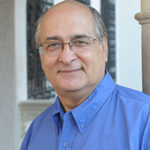
Science for English Learners #1 – Podcast Episode 104 | Classnotes Podcast 104
Podcast: Play in new window | Download
Classnotes Podcast (March 30, 2012) Learning the academic language of science can be tough for most students, but it is an even bigger challenge for students who are also learning English. Fortunately, teachers can structure their instruction in ways that support both the learning of science and the language of English in dynamic ways. Veronica Betancourt, M.A., an IDRA education associate, describes the first of seven research-based strategies IDRA has developed for delivering instruction differently for secondary students. The first strategy is: Building upon English learner language proficiency for effective science instruction. Veronica provides several examples for the classroom teacher that she has used in teacher training and mentoring. She is interviewed by Aurelio M. Montemayor, M.Ed.
Show length: 15:56
Send comments to podcast@idra.org
Sign up for Classnotes e-mail alerts.
Resources
Science Instructional Strategies for English Learners ~ A Guide for Elementary and Secondary Grades
by Abelardo Villarreal, Ph.D., Veronica Betancourt, M.A., and Kristin Grayson, M.Ed., IDRA
http://www.idra.org/publications/science-instructional-strategies-english-learners-guide-elementary-secondary-grades-2/
Differentiating Science Instruction using Language Proficiency Standards
By Veronica Betancourt M.A., and Kristin Grayson, M.Ed., IDRA Newsletter
http://www.idra.org/resource-center/differentiating-science-instruction/
Aligning for Success: Using Contextual Analysis in Science Professional Development
By Kristin Grayson, M.Ed., IDRA Newsletter
http://www.idra.org/resource-center/aligning-school-based-factors-for-student-success/
Breaking the Bonds of Boredom in Science and Math
By Veronica Betancourt, M.A., IDRA Newsletter
http://www.idra.org/resource-center/breaking-the-bonds-of-boredom/
Releasing the Mathematician and Scientist within Students
By Kathy Brown and Veronica Betancourt, M.A., IDRA Newsletter
http://www.idra.org/resource-center/releasing-the-mathematician/
You Can’t Win if You Don’t Get to Play – Effectively Engaging All English Language Learners
By Adela Solís, Ph.D., and Kristin Grayson, M.Ed., IDRA Newsletter
http://www.idra.org/resource-center/you-can-not-win/
Science Smart!
IDRA’s professional development that provides teachers with scientifically-based strategies to teach initiative scientific concepts, critical-thinking skills, problem-solving abilities and processes.
http://www.idra.org/Services/Science_Smart!_Secondary_Training/
Your feedback
We welcome your comments and questions to the podcast. Send an e-mail to podcast@idra.org.
Listen to every episode!
To ensure you don’t miss a single episode of IDRA Classnotes, subscribe to the podcast in iTunes, (download iTunes free if you don’t have it) or sign up to receive an e-mail alert as soon as a new show is published.



